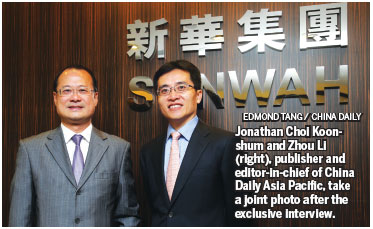ACFTA+1: A win-win framework
Updated: 2012-12-07 06:47
(HK Edition)
|
|||||||||

The inclusion of Hong Kong into the ASEAN-China Free Trade Area (ACFTA) would have a positive effect on the trading, manufacturing and services sectors of Hong Kong and the ASEAN countries, contributing to the economic development and further economic integration in the region, Jonathan Choi Koon-shum, former chairman of the Chinese General Chamber of Commerce (CGCC), told China Daily.
To the disappointment of enthusiastic advocates like Choi, the 21st ASEAN Summit held in Phnom Penh on November 18, 2012 failed to adopt an expected resolution on the proposed inclusion of Hong Kong into the ACFTA for unknown reasons.
However, Choi remains optimistic that the city will ultimately secure admission to the exclusive club, probably next year. Most ASEAN members have given their nod, he tipped.
Indonesian Trade Minister Gita Wirjawan told the Jakarta Post in September that ASEAN nations were conducting a study on whether Hong Kong should be admitted into the ACFTA. The study is expected to be complete early next year.
"We need a comprehensive study before integrating Hong Kong into ACFTA because the accession should bring real benefits for all ASEAN members and ACFTA," the minister was quoted as saying.
ACFTA is a free trade area among the 10 member states of the Association of Southeast Asian Nations (ASEAN) and China. Under the initial agreement, signed on November 4, 2002 in Phnom Penh, Cambodia, the tariffs on 90 percent of imported goods within the trade area were reduced to zero by 2010, and the remaining tariffs will be cut to zero by 2015. ACFTA is the largest free trade area in terms of population and the third largest in terms of trade volume after the European Economic Area and the North American Free Trade Area.
The CGCC, under the leadership of Choi over the past four years has vigorously advocated the proposed accession through formal channels. And he himself simultaneously continues to push for the accession, through his personal connections, built during his over 30 years in business in the region.
Their enthusiastic endeavour stems from Choi's very belief that "ACFTA plus one" is a win-win framework that will benefit all three sides - ASEAN, Hong Kong and the Chinese mainland - a belief that has been proven by an independent study commissioned by CGCC earlier this year.
The study conducted by Asian Strategy & Leadership Institute, a leading independent think tank in Malaysia, looked into the implications and affects of Hong Kong's accession to ACFTA on the regional economy, using objective economic models.
"The results of the study are very positive," Choi told China Daily.
The results indicate that Hong Kong's accession will enhance trade ties and the growth of services sectors in the region on one hand, and help ASEAN countries to develop their industries on the other hand, according to Choi.
This ultimately will not only promote the region's economic development, but also boost economic integration within the region - an object of the trading block.
As a regional business and financial center, Hong Kong can play a bigger role as a trade facilitator between China and ASEAN after joining the free trade area, Choi reckons.
With the Hong Kong accession, ASEAN's exports to China are projected to increase 28 percent, according to the study.
Currently, ASEAN is China's third largest trading partner whereas China is ASEAN's largest trading partner, with bilateral trades totaling $362.9 billion in 2011. Meanwhile, Hong Kong is the eighth trading partner of ASEAN and its fifth major export destination, according to data compiled by CGCC.
As the services sectors in Hong Kong and ASEAN have high complementarities, increased trade in goods will generate stronger demand for support services in the region, which will help boost the growth of services sectors in both sides.
Cross-border investments within the region are also expected to be significantly boosted with the inclusion of Hong Kong into the trading block, according to the CGCC-commissioned study, which notes that the certainty created by having Hong Kong on board ACFTA will help ASEAN nations to attract more direct investment from Hong Kong companies and mainland firms, helping boost the growth of ASEAN's industries.
With the encouragement of China's "going-out" policy, mainland companies have aggressively pushed their overseas expansion plans in recent years but many have failed in their endeavors for lack of the necessary international expertise or connections. Hong Kong, with its supreme soft power such as international connections, sound legal system and international-standard professional services, is in an excellent position to serve as a springboard for mainland companies going abroad, Choi explained.
Reciprocally, more ASEAN companies will be encouraged to expand their operations into the China market by tapping the expertise and high-standard business support services of Hong Kong. The city's international financing platform will also better serve ASEAN companies in meeting their financial needs.
With the accession to ACFTA, Hong Kong, which has long been a key intermediary for trade between China and ASEAN, will see a boost to its new positioning as a "going-in and going-out" platform for ASEAN and Chinese enterprises, Choi said.
Over all, the accession to the trading block will help strengthen Hong Kong's position as a trade, shipping and financial center, as re-exports, professional services and financial activities in the city are expected to see a big boost, he concluded.
(HK Edition 12/07/2012 page4)